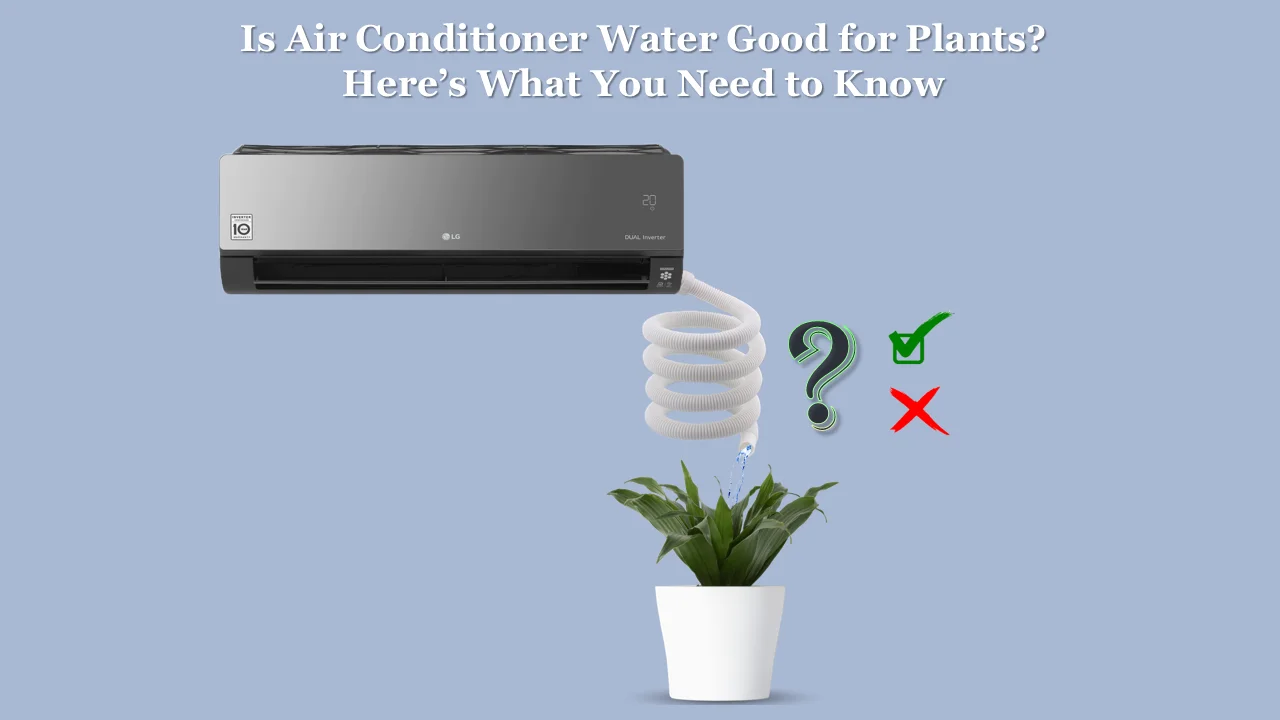
Air conditioner water, also known as condensate water, is the water that is collected from the air conditioning unit as it cools the air inside a building. This water is often considered to be waste and is typically drained away. But have you ever thought about what happens to the water drips from your air conditioner? Like many people, I also wondered if it could be used to water plants. Is Air conditioner water good for plants?
Yes, air conditioner water is good for plants because it is free from chlorine, minerals, salts, or any other harmful chemicals, making it a safe option for watering plants. Watering outdoor plants is 100% safe and good but when watering indoor plants, mix it with normal tap water.
This question first came to my mind when I visited one of my friend’s houses and saw that he has kept a flowerpot below the water hose of his air conditioner. AC water is dripping to this flowerpot.
I got curious and enquired about the same. He told me that AC produces lots of pure water in a day that can be used for outdoor as well as indoor plants but you need to keep certain things in mind such as types of plants, soil, moisture level, etc before using AC water. Thereafter I dug deep into it on the internet.
I also asked my HVAC engineer friend and consulted my gardener. I decided to share my findings in the form of this article.
In this blog post, we’ll cover everything you need to know about using air conditioner water for your plants. We’ll discuss the benefits of using AC water and how to properly care for your plants when using this type of irrigation.
So whether you’re a gardener looking for a new way to water your plants or simply curious about this topic, read on to find out more!
- Why Does an Air Conditioner Produce Water?
- How much Water Can an Air Conditioner Produce in a Day?
- Is Air Conditioner Water Good for Plants?
- How Is Air Conditioner Water Different From Regular Water?
- How Do Plants Respond to Air Conditioner Water?
- What are the things to consider when Watering Plants?
- Where we should avoid using Air conditioner Water?
- How Is Air Conditioner Water Detrimental to Plants?
- Tips on Watering Plants with AC Water
- Practical Use
- Frequently Asked Questions
- Final Verdict
But before we dive deep into the topic, let’s first understand why an air conditioner produces water and how much water it can produce in a day.
Why Does an Air Conditioner Produce Water?
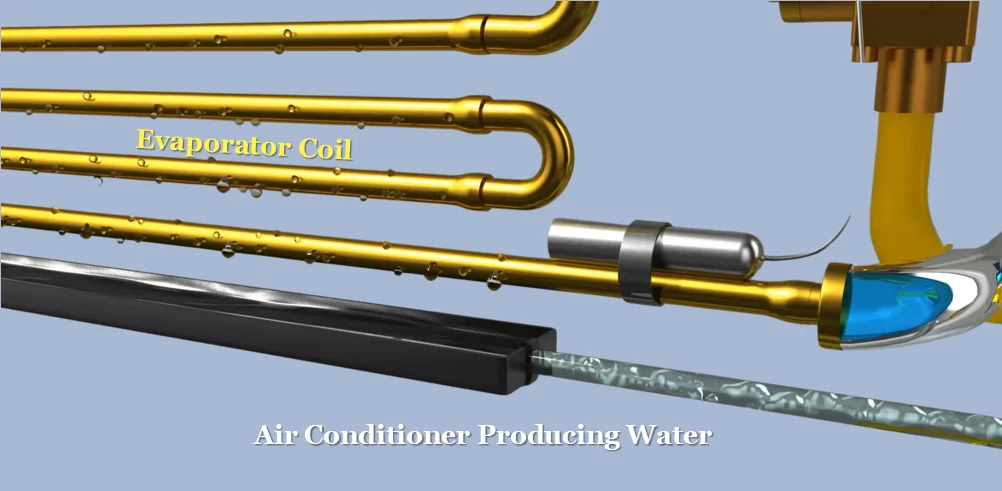
We all know that the air contains water in the form of water vapor. The higher the humidity of the air, the greater the water vapor content. Air conditioners produce water as a byproduct of the cooling process.
When an air conditioner cools the air in a room, it also removes moisture from the air. This moisture collects on the evaporator coil, which is a part of the air conditioning system.
The collected moisture then drips off the coil and collects in a drain pan, from where it is removed from the air conditioner. This is why you may notice water dripping from your air conditioner, especially during the summer when it is used frequently.
How much Water Can an Air Conditioner Produce in a Day?
Most air conditioners produce between 15 and 70 liters of water per day, depending on how big the air conditioner is. However, this number depends not only on the size of the Air Conditioner unit but also on the weather condition of the area.
In dry climates where average relative humidity remains less than 50 percent most of the time, a regular size residential air conditioning unit running 24 hours can produce up to 15 to 20 liters of water per day.
But this figure increases drastically in humid environments and can reach as much as 70 to 75 liters of water daily!
Is Air Conditioner Water Good for Plants?
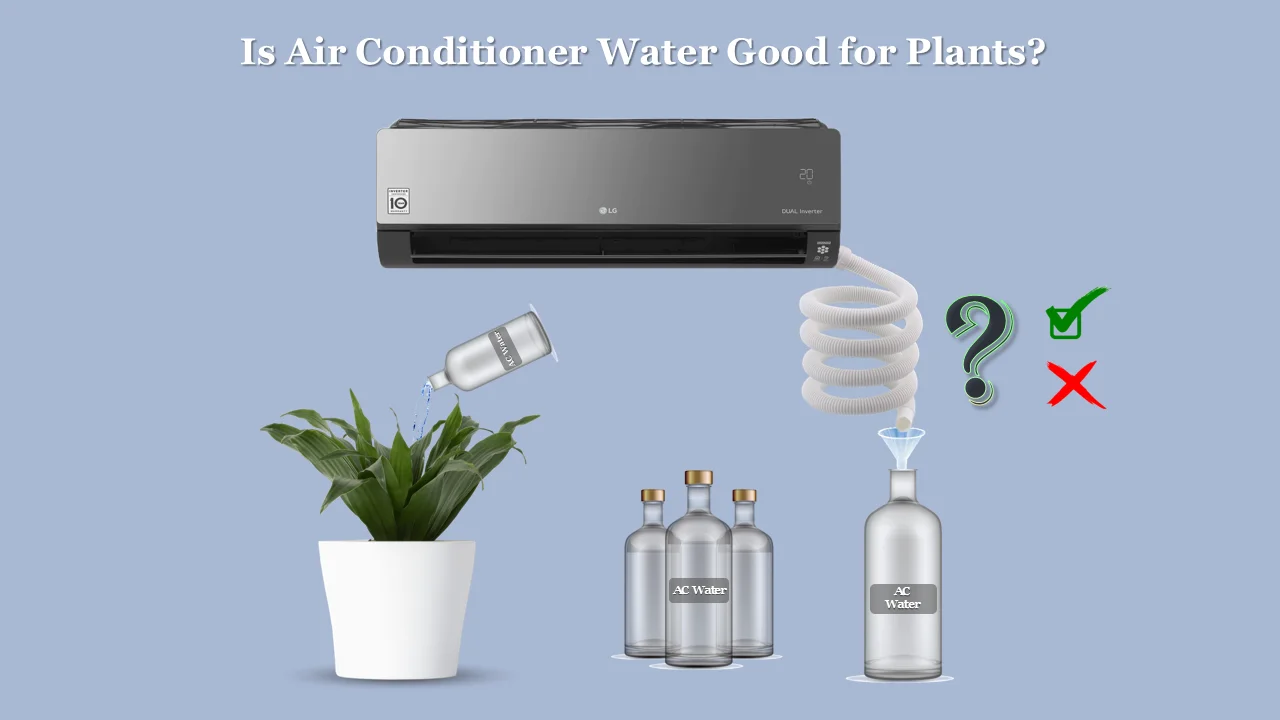
The short answer is yes, air conditioner water is safe for plants. In fact, it can be beneficial for them because AC water is free of chemicals or additives such as chlorine, minerals, and salts that may harm plants. It is simply water that has been cooled and filtered through the air conditioner, making it clean and pure.
Additionally, air conditioner water has a slightly acidic pH level, which can benefit plants that prefer slightly acidic soil. It can help to improve the overall health and growth of your plants.
Furthermore, air conditioner water is often cooler than tap water, which can benefit plants during the hot summer months. Cooler water can help to prevent wilting and keep your plants hydrated and healthy.
However, it would be best to consider the temperature of the air conditioner water before using it to water your plants. If the weather is moderate or cold, we recommend you let the AC water sit for a bit to cool down to room temperature before watering your plants.
As plants can be sensitive to temperature changes and using water that is too cold can cause them to go into shock and potentially damage their roots. Letting it cool down will help prevent shock to the plants and ensure they receive the optimal moisture.
Additionally, there are a few other things to remember if you use air conditioner water for your plants. First, it is essential to ensure that the water is collected in a clean container and is free of debris or dirt.
This will help ensure that your plants receive clean, pure water and will prevent any debris or dirt from getting into the soil and potentially harming your plants.
It is also important to check the water for any chemicals or additives that may have been added due to coolant leakage and these can be harmful to plants if they are present in the water. If you are unsure, it may be best to avoid using water for your plants.
Finally, remember that air conditioner water is not a replacement for regular watering. Plants still need a steady supply of clean, fresh water to thrive, and using only air conditioner water to water your plants is not a sustainable solution in the long term.
Use air conditioner water as a supplement to your regular watering routine, and make sure to provide your plants with a regular supply of fresh, clean water as well.
How Is Air Conditioner Water Different From Regular Water?
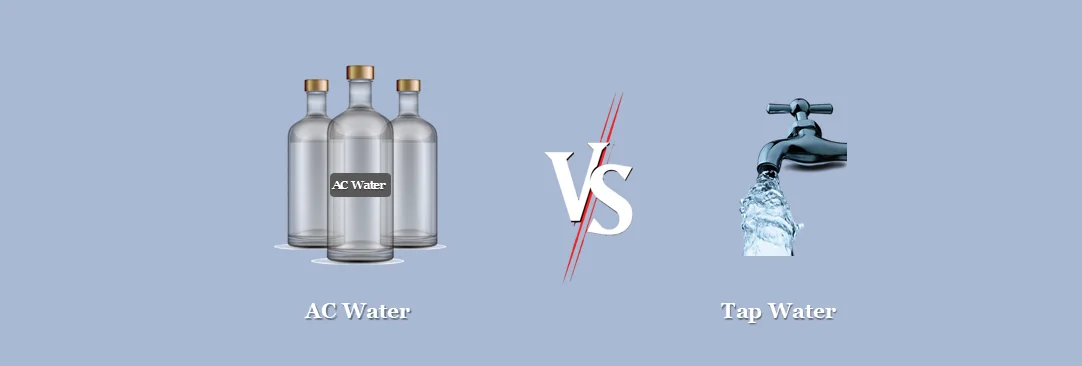
At first glance, AC water may seem like just regular water. However, there are a few key differences that make AC water uniquely suited for plants.
First and foremost, if not collected properly, AC water has impurities and low minerals that can have adverse effects on plant growth. This means that AC water contains much fewer nutrients than regular tap or well water, making it perfect for use with sensitive plants like succulents or houseplants.
In addition, AC water typically has a lower pH level i.e. acidic than regular tap or well water. This makes AC water ideal for certain types of plants that prefer acidic soil conditions, such as blueberries or azaleas.
So, AC water is an excellent option for gardeners looking to care for their plants in a simple, efficient way. If you’re ready to give AC water a try with your plants, be sure to follow the tips below for optimal results!
How Do Plants Respond to Air Conditioner Water?
There is a universal truth when it comes to water: all living things require at least some amount of it. Apart from saltwater or heavily diluted water, most plants will happily absorb water to survive. With this said, some preferred types of water adequately support plant health.
Furthermore, there are also some differences between how common outdoor plants respond to water type vs. potted indoor plants.
Outdoor Plants
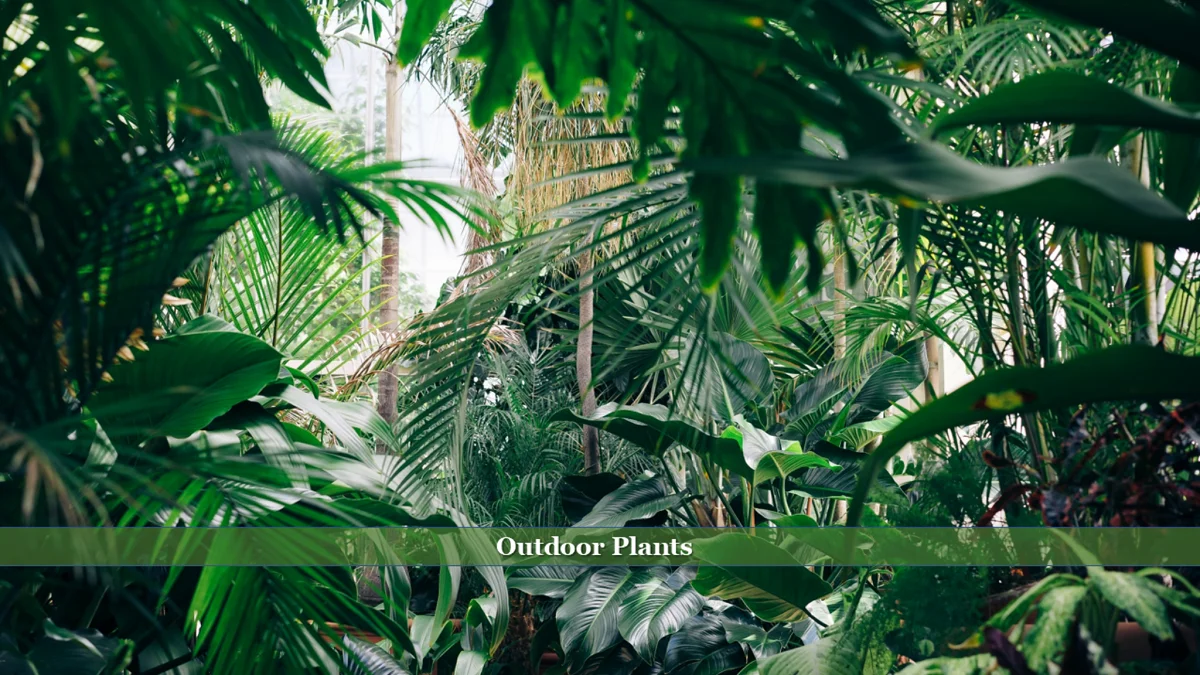
When exposed to AC water, outdoor plants tend to thrive and flourish. This is because AC water is similar to rainwater which lacks minerals and other impurities that can have adverse effects on plant growth, making it ideal for use with sensitive plants like succulents or houseplants.
Most outdoor plants do not have humans to give them water, so rain is the main source of water for plants. Outdoor plants can absorb all the required minerals from the soil with the help of rainwater through their root systems.
Air conditioner water is ideal for use with sensitive plants like Succulents or Houseplants.
Rainwater is not ideal, but the minerals are replaced through soil pickup. So, if you have plants underneath a window air conditioner or near an outdoor unit, the distilled water will mix with the soil and no nutrients will be lost.
There could be a problem if the unit is always dripping water onto plants or grass. Too much water can hurt them.
Indoor or Potted Plants

Meanwhile, potted plants tend to respond very differently to AC water than their outdoor counterparts. This is because AC water does not contain enough presence of minerals like calcium or magnesium which are necessary for a healthy indoor environment.
Also, AC water typically has a lower pH level than regular tap or well water, which may be beneficial for some types of potted plants that prefer acidic soil conditions.
For indoor plants, mix Air conditioner water with normal tap water and make sure it’s at room temperature before pouring it into your plants.
Moreover, if you use too much cold AC water on your indoor plant then you risk causing root shock which may damage the roots and other parts of the plant.
However, we still recommend mixing AC water with normal tap water when using it with indoor or potted plants.
Overall, whether you’re using AC water for outdoor plants or potted plants, it’s important to carefully monitor your garden’s response and adjust your watering practices accordingly. With the right care and attention, AC water can be a great tool for growing healthy, beautiful plants no matter where you live!
What are the things to consider when Watering Plants?
There are several things to consider when watering plants to ensure that they receive the proper amount of moisture and nutrients.
Nature of Water
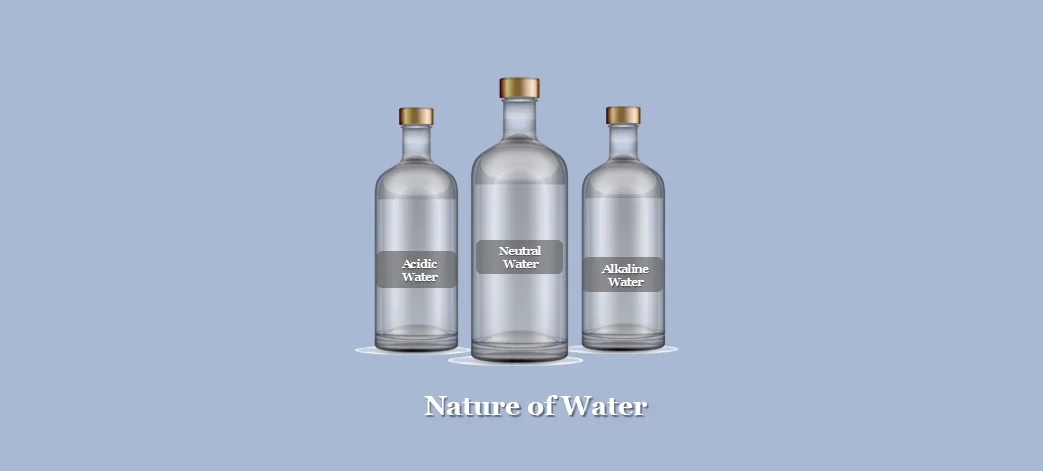
In general, water used for watering plants should be neutral in pH. A pH level of 7 is considered neutral, and most plants thrive in soil with a neutral pH.
Water that is too acidic or alkaline can be harmful to plants, as it can prevent the plants from absorbing important nutrients from the soil. Water with a pH level below 7 is considered acidic, while water with a pH level above 7 is considered alkaline.
Acidic water or too alkaline water is harmful to plants.
If the pH level of your water is not neutral, you can adjust it by adding certain substances to the water. For example, adding baking soda to water can raise the pH level and make the water more alkaline, while adding vinegar can lower the pH level and make the water more acidic.
It is also important to note that the pH level of your water can vary depending on the source of the water. For example, well water may have a different pH level than tap water, so it is important to test the pH level of your water before using it to water your plants.
We personally advise you to use neutral pH water for watering your plants to ensure that they receive the proper amount of nutrients and stay healthy.
Time of Day
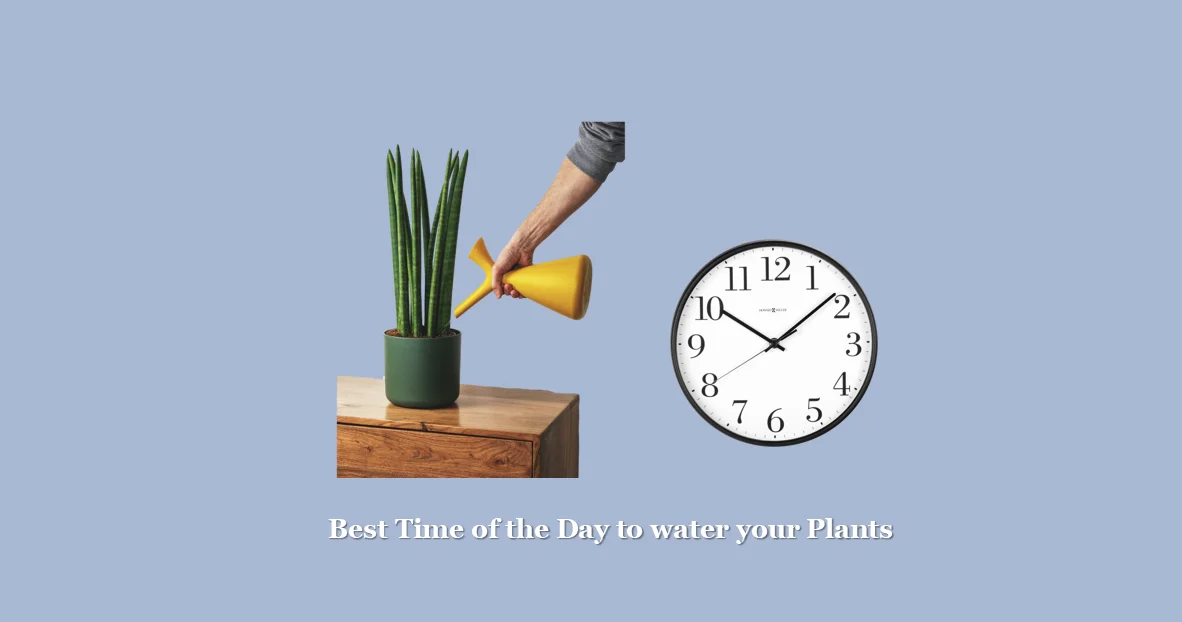
It is important to water plants at the right time of day. Watering in the morning or early afternoon, when the sun is not at its hottest, will help ensure that the water has a chance to be absorbed by the soil and reach the plant’s roots before it evaporates. It also allows the plants to absorb moisture before the heat of the day evaporates it.
Watering in the evening or at night can also be beneficial, as it allows the plants to hydrate overnight and prevents them from wilting in the heat of the day. It can also help prevent the water from evaporating and give the plant time to absorb it overnight.
Part of the Plant to Water
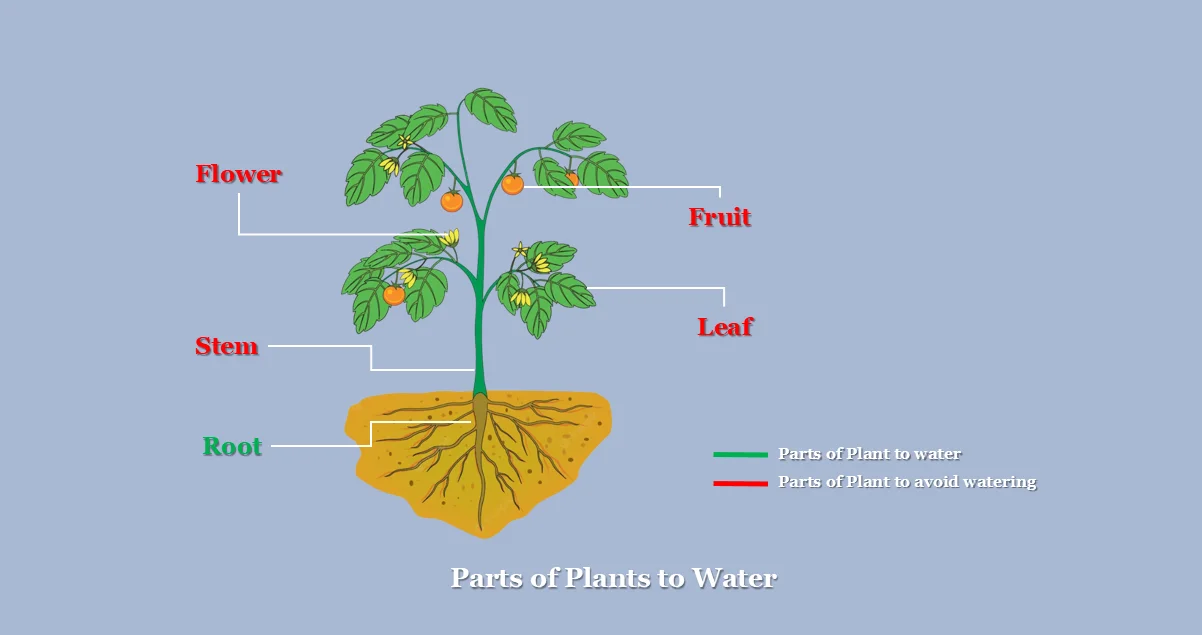
It is important to water plants at the base of the plant, rather than watering the leaves or flowers. This helps to prevent fungal growth and keeps the plant healthy.
Additionally, avoid getting water on the leaves as this can cause damage or encourage fungal growth. Be sure to check the drainage of your soil as well, especially if you’re growing plants in containers.
Type of Water
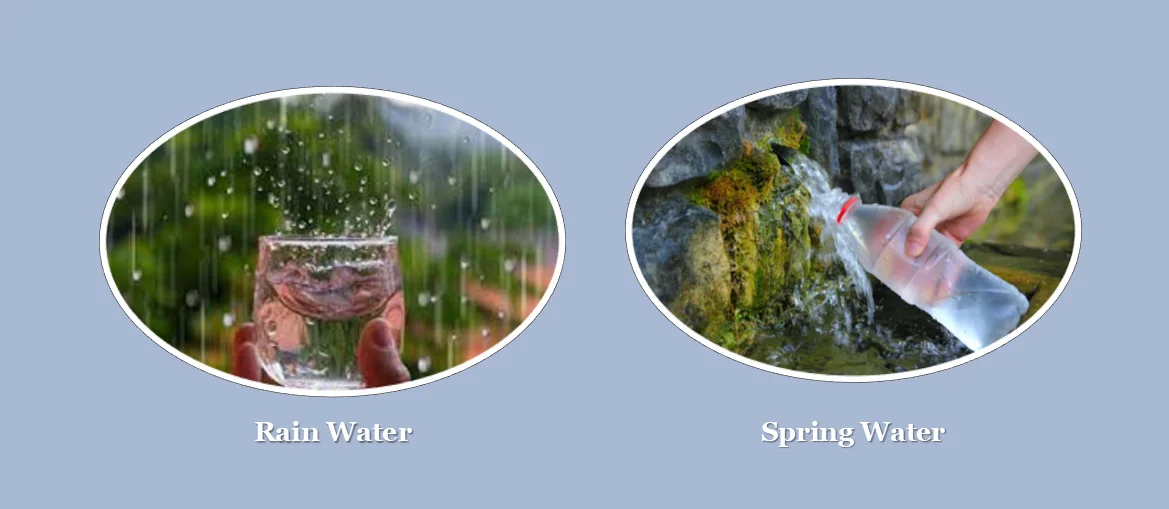
Rainwater and springwater are generally considered to be the best options for watering plants. Rainwater is pure and free of chemicals, making it an excellent source of moisture for plants. It is also naturally acidic, which can be beneficial for plants that prefer slightly acidic soil.
Spring water is also a good option for watering plants. It is typically pure and free of chemicals, and it is often slightly cooler than tap water, which can be beneficial for plants during the hot summer months.
However, it is important to consider the specific needs of your plants before choosing a watering source. Some plants, such as succulents and cacti, prefer well-draining soil and may not do well in consistently moist soil. In these cases, it is best to stick to using tap water or watering from the bottom to avoid overwatering.
Overall, rainwater and springwater are generally considered to be the best options for watering plants. However, it is important to consider the specific needs of your plants and choose the appropriate watering source accordingly.
Type of Plants
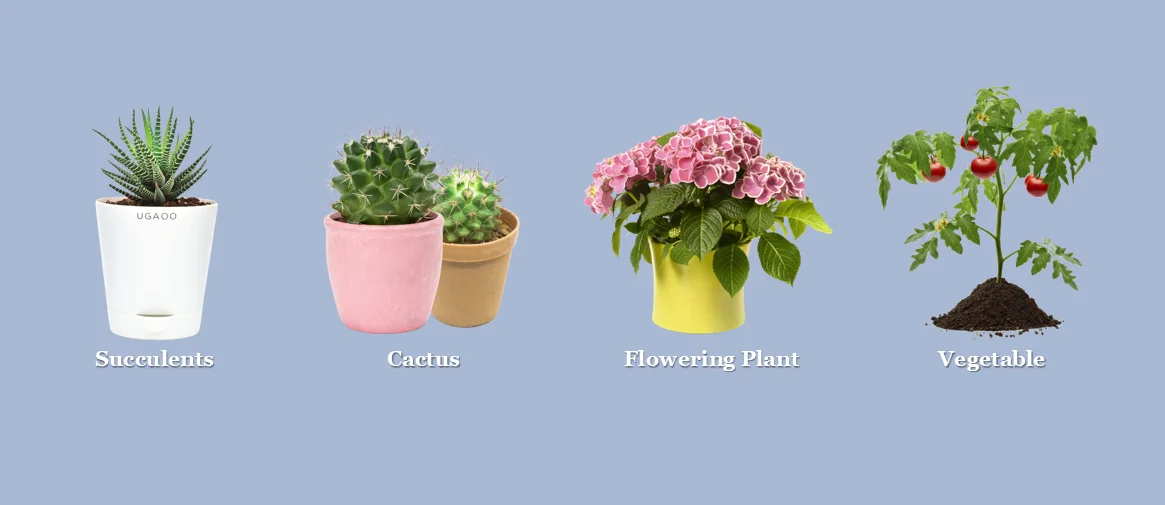
It is important to consider the type of plant you are watering and the specific watering needs of each plant. Different plants have different watering needs. Some plants, such as succulents and cacti, prefer to be watered less frequently and require well-draining soil.
Different types of plants have different watering needs
Other plants, such as vegetables and flowers, require more frequent watering and may benefit from the use of fertilizer to provide additional nutrients.
Taking the time to learn more about your plants and how to care for them can help ensure that they remain healthy and vibrant.
Soil Type and Moisture Level
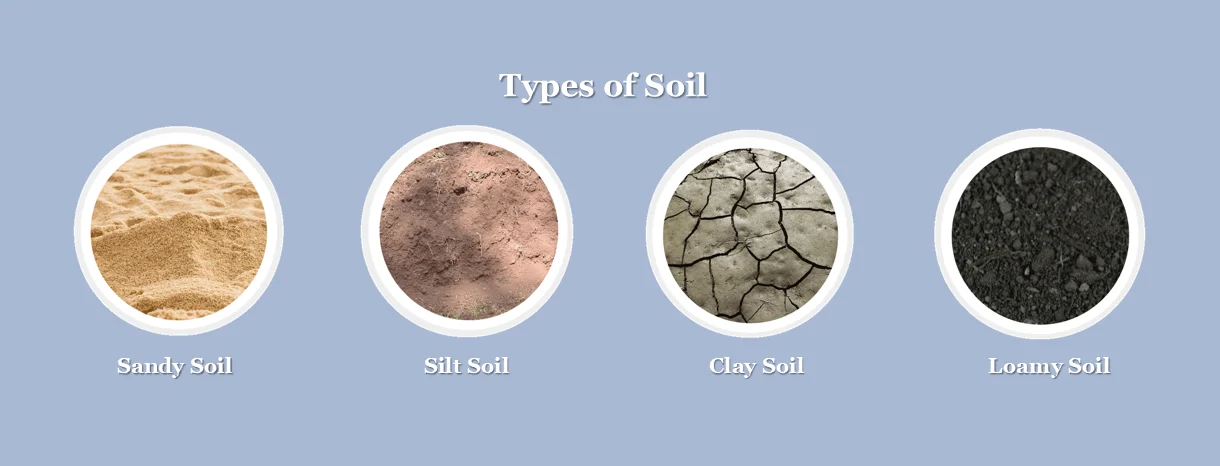
Plants that are grown in sandy soil will require more frequent watering than plants grown in clay soil, for example. Additionally, it is important to check the moisture level of the soil before watering your plants to avoid overwatering.
A good way to determine if your plants need more water is to check the soil. Stick your finger into the soil up to your first knuckle, and if it is dry then it’s time to water. If the soil sticks to your finger when pulled out, then you should wait a few days before checking again.
Over watering your plant can cause root rot and other plant diseases.
It is also important to remember that different plants require different amounts of water or moisture levels, so it is best to research the species before planting them. When watering, make sure to not overwater, as this can cause root rot and other plant diseases.
Soil as Filter and Purifier
Yes, soil can act as a filter. Soil is made up of tiny particles, such as sand, silt, and clay, as well as organic matter and microorganisms. These particles and organisms help to filter out impurities and pollutants from water, making it cleaner and safer for plants and other organisms.
When water passes through the soil, the soil particles and organic matter act as a physical barrier, trapping and removing pollutants such as sediment, heavy metals, and chemicals. The microorganisms in the soil also help to break down and remove pollutants from the water, further purifying it.
In addition to filtering pollutants, soil can also help to regulate the pH level of water. Soil naturally has a slightly acidic pH level, and it can help to buffer the pH of water, making it more neutral and suitable for plants.
The air conditioner’s water is low in minerals, but it can absorb minerals from the soil when it is poured into it. However, this only works when there is a lot of soil present, like in an outdoor environment or for outdoor plants.
The problem with indoor plants is that the quantity of soil is less because we use small pots and containers. There is such a small amount of soil that it cannot filter out contaminants and if the air conditioner water contains unwanted or harmful chemicals, the contaminants will build up over time in the pots.
Weather and Climate of the Area
It is also important to consider the weather and climate when watering your plants. Plants will typically need more water in hot, dry weather, while they may require less water in cooler, wetter conditions.
Temperature of Water
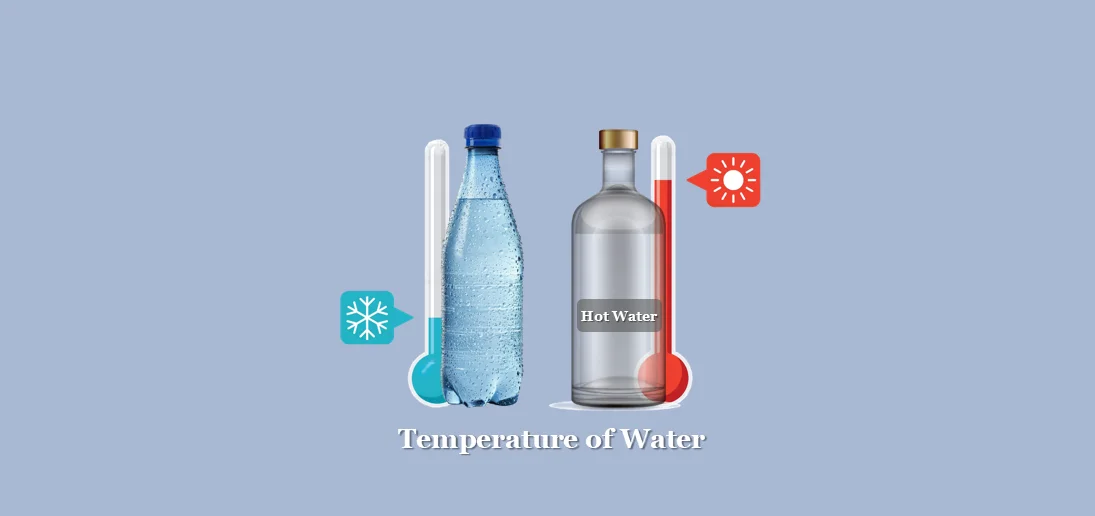
It is recommended to use room temperature water for watering your plants because too hot and too cold water is not good for plants.
Air conditioner (AC) water is typically cold. Air conditioners work by removing heat and moisture from the air, and the water that drips from the AC unit is the condensation that is created by this process.
Because the AC unit is removing heat from the air, the water that is produced is often cooler than the ambient air temperature. This can make it a good option for watering plants, as it can help to prevent wilting and keep plants hydrated and healthy during the hot summer months.
It is important to note that the temperature of AC water can vary depending on a number of factors, such as the size and efficiency of the AC unit, the humidity and temperature of the air, and the length of time the unit has been running. However, in general, AC water is typically cooler than tap water.
Overall, AC water is cold and can be a good option for watering plants during the hot summer months. However, if the weather is not too hot we recommend collecting the condensate water in a bucket and making sure it’s at room temperature before pouring it into plants.
Where we should avoid using Air conditioner Water?
Air Conditioner water is not suitable for drinking or other consumption. This is because the condensate is contaminated with bacteria and other impurities that are removed from the air during the cooling process.
In addition, the condensate may contain chemicals and other substances that are used in the air conditioning system, such as refrigerants and cleaning agents.
How Is Air Conditioner Water Detrimental to Plants?
While AC water may seem like an attractive option for gardeners looking to care for their plants, it can actually be detrimental to plant health in a number of ways.
Lack of Nutrients
First and foremost, AC water is low in nutrients that are essential for healthy plant growth. This means that AC water often does not contain the essential minerals and micronutrients needed to support robust plant growth.
Low pH Level
In addition, AC water tends to have low pH levels that can negatively impact certain types of plants. For example, acidic AC water may lead to nutrient deficiencies or cause damage to delicate roots and leaves.
Bacterial Growth
Finally, AC water is often a prime environment for bacterial growth, which can quickly overrun and damage your plants. To avoid this problem, be sure to regularly sterilize AC water with bleach or other disinfectants before using it to irrigate your garden.
Overall, AC water may seem like an attractive choice for gardeners, but in reality, it can lead to poor plant health and even death if not properly managed. So if you’re serious about growing healthy plants in your garden, it’s best to mix the AC water with regular tap or well water instead.
Tips on Watering Plants with AC Water
Here are some tips for watering plants with the help of air conditioner (AC) water:
- Collect the AC water in a clean container. Make sure the container is clean and free of any debris or chemicals that could harm your plants.
- Use the AC water as soon as possible. AC water is typically cooler than tap water, and it may warm up quickly if left in a container. It is best to use the water within a few hours of collecting it.
- Water plants at the base of the plant, rather than the leaves or flowers. This helps to prevent fungal growth and keeps the plant healthy.
- Consider the specific watering needs of your plants. Some plants, such as succulents and cacti, prefer to be watered less frequently and require well-draining soil. Other plants, such as vegetables and flowers, require more frequent watering and may benefit from the use of fertilizer to provide additional nutrients.
- Monitor your plants closely and adjust your watering routine as needed. Keep an eye on the moisture level of the soil and the health of your plants, and adjust your watering schedule accordingly.
Overall, watering plants with AC water is generally safe and can be beneficial for many plants. By following these tips, you can help to keep your plants healthy and hydrated during the hot summer months.
Practical Use
When we looked for information about whether it is good to use AC water for plants, we found that different people had different opinions in other words, we found mixed results.
Some people say that their plants started growing faster when they used AC water. Other people say that their plants started dying when they used AC water.
One person said that he has been watering plants for a long time and he hasn’t seen any problems. Another one said that their plants died after using AC condensate water all the time.
We think that you should try this for a week and see how it goes. Share your experience with us in the comment section below. It might help other people who like plants too.
Frequently Asked Questions
Final Verdict
In conclusion, using air conditioner water to water your plants can be a great way to provide them with valuable nutrients and save water. However, it is important to use this water carefully and in moderation and to consider the potential drawbacks.
To use air conditioner water safely and effectively for your plants, make sure to collect the water in a clean container, let it cool down to room temperature, and check for chemicals before using it to water your plants.
Additionally, remember that air conditioner water is not a replacement for regular watering, and make sure to provide your plants with a regular supply of fresh, clean water as well.
Finally, remember that AC water is low in nutrients and may need to be supplemented with fertilizer to promote healthy plant growth. This can usually be done by following the instructions on the fertilizer label or consulting an expert for advice on what type of fertilizer is best suited for your plants.
Overall, if you take the time to properly care for your plants and provide them with the moisture they need, you can safely and effectively use air conditioner water to help them thrive.
So if you’re looking to take advantage of AC water in your garden, remember to start slowly and pay close attention to the needs of your plants. With the right care and planning, AC water can be an excellent tool for cultivating healthy, vibrant plants!
So what are you waiting for? Get started today and watch your garden thrive with AC water as your new irrigation tool.
Also Read: Can We Use AC Water in Inverter Battery?
User Rating: ( votes)

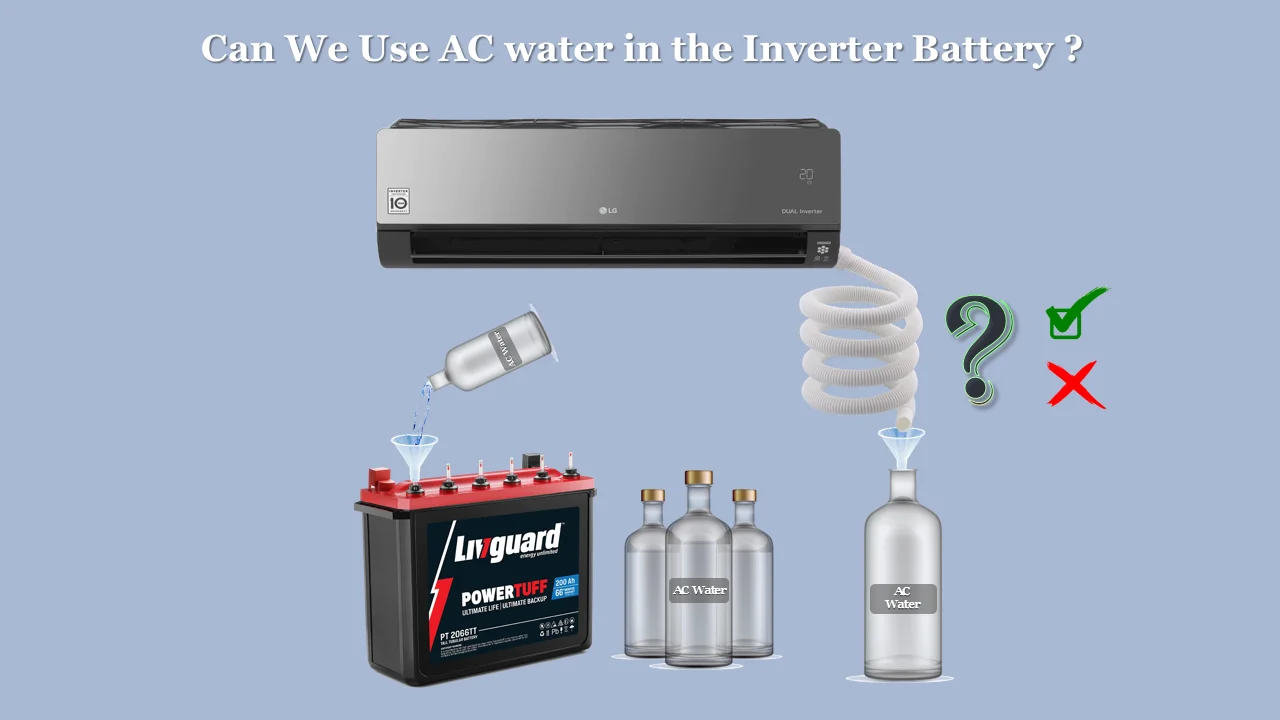
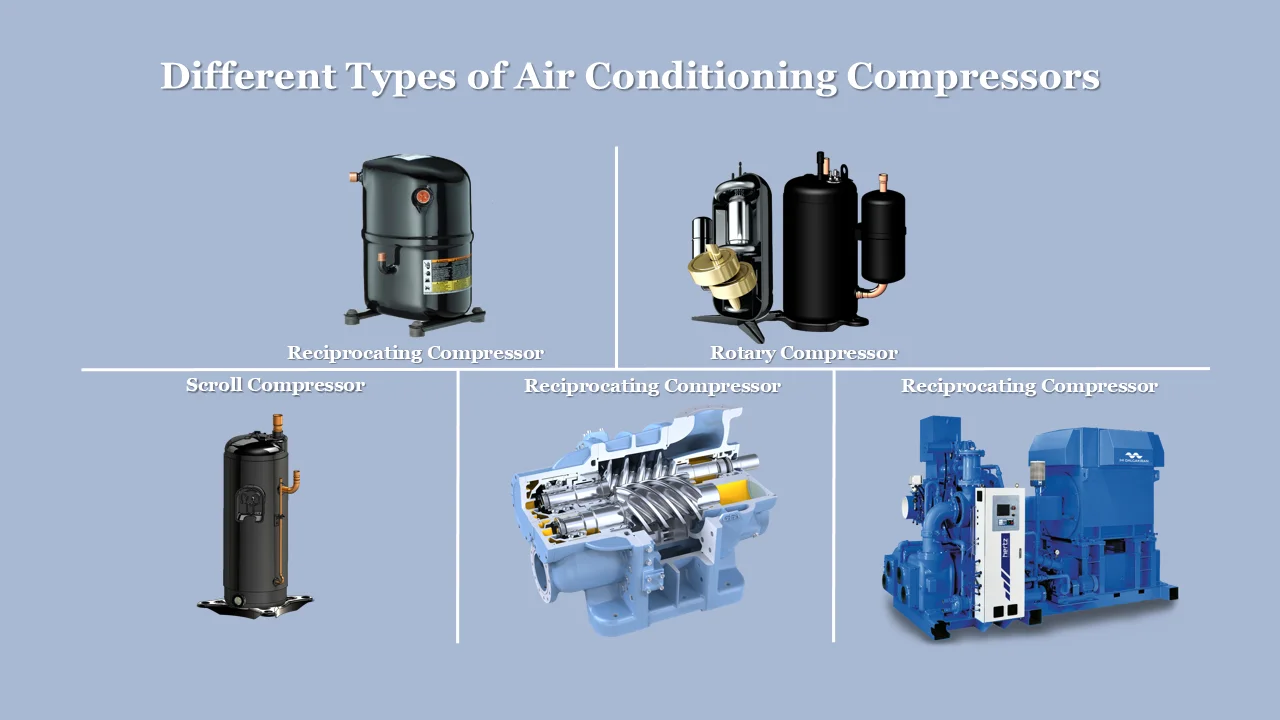
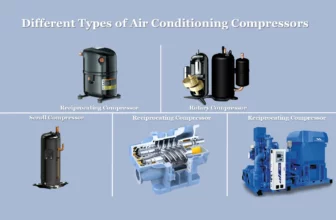
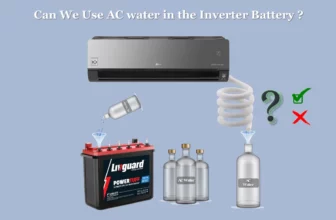




Thank you for such a informative article and explaining all things.